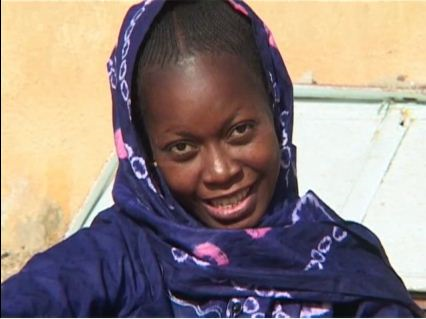News & Updates
Obstetric fistula stories and announcements
Obstetric fistula stories and announcements

In a rural central Ugandan village, 17-year-old Sulaina sits on the mud floor of the tiny home she shares with her mother and younger brother and sister.
She wants to help provide for her family. But she can't. She can barely leave her house.
Wherever she goes, a sickly smell follows her. That's because she is constantly leaking urine.
Read MoreIn a rural central Ugandan village, 17-year-old Sulaina sits on the mud floor of the tiny home she shares with her mother and younger brother and sister.
She wants to help provide for her family. But she can't. She can barely leave her house.
Wherever she goes, a sickly smell follows her. That's because she is constantly leaking urine.

Sulaina with her family in the village of Serinya. Photo: BBC
The rags she has stuffed in her underwear are drenched quickly, and then the urine starts running down her legs.
She has sores all over her thighs where the urine has burned her.
Sulaina has a condition called obstetric fistula. She developed it after giving birth to a baby girl last year.
Read more
Watch the video

Child marriage not only violates the human rights of girls, but also gravely threatens their lives, education opportunities, health and future prospects. When girls are married, they are expected to begin childbearing while still children themselves, increasing their risks for pregnancy-related complications—a major cause of death and disability for adolescent girls in the developing world.
Watch the videoChild marriage not only violates the human rights of girls, but also gravely threatens their lives, education opportunities, health and future prospects. When girls are married, they are expected to begin childbearing while still children themselves, increasing their risks for pregnancy-related complications—a major cause of death and disability for adolescent girls in the developing world. We travel to Mozambique, a country with one of the highest rates of child marriage and maternal death in the world, along with wide prevalence of a devastating childbirth injury called obstetric fistula. But efforts are underway to change mindsets and to ensure all young girls enjoy their human rights. This film is included in the UN in Action series.

A national campaign has given 211 Malagasy women hope for a normal life. Three hospitals on the country's South-eastern coast participated in the campaign from 19 August to 19 September 2013, providing fistula repairs free of charge.
Read MoreA national campaign has given 211 Malagasy women hope for a normal life. Three hospitals on the country's South-eastern coast participated in the campaign from 19 August to 19 September 2013, providing fistula repairs free of charge.
Organized by the Ministry of Health in partnership with UNFPA, the International Society of Obstetric Fistula Surgeons (ISOFS), the non-profit organization OperationFISTULA and the University of Antananarivo, the effort was part of the global Campaign to End Fistula launched by UNFPA and its partners with the goal of making obstetric fistula as rare in developing countries as it is in the developed world.
Thousands of women and girls live with obstetric fistula in Madagascar. An estimated 2,000 women develop fistula every year in the country.

Women suffering from fistula before the surgery (photo: Guifty Banka/UNFPA)
“For every woman who dies, a family is broken. The surviving children are deprived of the care of their mother. These deaths represent the ultimate failure of maternal and reproductive health services. If the women are lucky enough to survive an obstructed labor, many will still develop debilitating childbirth injuries such as obstetric fistula,” said the UNFPA Representative in the country, Ms. Agathe Lawson.
Patients who benefited from the campaign included 19-year-old Viviane, who lived with fistula for six years before getting treatment. Viviane became pregnant at the age of 13, and although she went to see a doctor during her pregnancy, the childbirth took place at home with the assistance of a traditional birth attendant.
“After being in labour and extreme pain for three days, my parents decided to take me to the hospital. But it was too late, my baby was dead and I had developed a fistula,” Viviane said.
Another beneficiary, 46-year-old Therese, suffered from fistula for 30 years and had her sixth surgery during the campaign. “After the death of my first child, I had four pregnancies more, but all my babies were stillborn… I hope to return to a normal life after this surgery,” she said.

Malagasy surgeon-trainees with campaign organizers: Seth Cochran, founder of OperationFISTULA (third row), Dr. Edwige Ravaomanana, UNFPA Programme Officer for reproductive health (second row, third from left), Glendora Meikle, project director of OperationFISTULA (first row, first from left (Photo: OperationFISTULA)
Supporting the 2013 campaign, the World Food Programme (WFP) handed out meals to the hospitalized women and their families for the whole time they were away from home.
Three surgeons from ISOFS and the Ministry of Health trained nine Malagasy surgeons in fistula repair during the campaign. This 12-strong team of surgeons split over the three hospitals to conducted fistula repairs free of charge. “Every woman with an obstetric fistula is a failure of our health system. Girl-child education and women's empowerment are the most important contributions to prevent obstetric fistula,” said Dr. Thomas Raassen, President of ISOFS, one of the fistula surgery trainers.
Supporting skilled surgeons living in critically under-served areas in Africa and Asia, volunteer-led OperationFISTULA was also involved. "The goal of OperationFISTULA is to empower local surgeons and enable all women with fistula to be treated in a safe and high quality manner. We want to dramatically improve the lives of these women," said Seth Cochran, founder of OperationFISTULA.
Ten hospitals are currently offering fistula surgery in Madagascar, however there is a limited number of health care professionals with the necessary skills. Dr. Mahamat Koyalta, an experienced fistula surgeon from Chad, was among the international surgeons training Malagasy colleagues. He worked with two Malagasy surgeons who he started training two years ago. “The surgeons are excellent. In two or three years’ time, they will be able to train their colleagues,” Dr. Koyalta stressed.
Reported by Guifty Banka

Niger’s ten years of engagement in the fight against obstetric fistula has borne fruit, concluded a workshop held from 8 to 10 October 2013 in the capital Niamey. Organized by UNFPA, the United Nations Population Fund, the even gathered more than 70 health professionals and partners working to end obstetric fistula in several countries.
Learn moreNiger’s ten years of engagement in the fight against obstetric fistula has borne fruit, concluded a workshop held from 8 to 10 October 2013 in the capital Niamey. Organized by UNFPA, the United Nations Population Fund, the even gathered more than 70 health professionals and partners working to end obstetric fistula in several countries. Fistula focal points from UNFPA country offices in the Central African Republic, Chad, the Democratic Republic of the Congo and Mauritania also participated in the workshop to learn from Niger’s rich experience in addressing obstetric fistula, and to improve south-south cooperation.
A cornerstone of fistula response in Niger was the creation of a network that brings national and international stakeholders around the table to discuss challenges and plan for action.
“In general, obstetric fistula touches poor, illiterate and rural women. Due to its dehumanizing consequences, fistula constitutes a public health problem to which Niger has responded by creating the REF—Réseau d’Eradication de la Fistule [Network to Eradicate Fistula]—which gathers all partners in this fight and enables the group to achieve concrete results,” Niger’s Minister of Health Mano Aghali said at the opening of the event.

Minister of Health Mano Aghali (c.) chairs the opening session of the workshop; Monique Clesca, UNFPA Representative in Niger (l.); Gillian Slinger, Coordinator of the Campaign to End Fistula (r.) Photo: UNFPA.
Monique Clesca, UNFPA Representative in Niger said the UN agency has mobilized partners in the country to create the REF around the Ministry of Health. Since 2004, UNFPA has always been an active partner in the fight against fistula in Niger, supporting treatment for about 70 per cent of fistula cases cases identified in the country. Until 2010, UNFPA was the only financing partner for social reintegration activities.
To address the complex problem of fistula, Niger has implemented a strategy based on the three pillars of prevention, medical treatment and reintegration of women into society and the labour market.
Prevention first
Prevention is paramount as obstetric fistula is a direct consequence of poor access to health services during pregnancy and childbirth The REF has carried out numerous community-based activities to increase prevention, such as initiating and supporting community radio stations and women’s associations, operating awareness raising caravans and screening films in villages and towns.
Since 2005, 1,577 women cured from fistula have been trained as community focal points for local awareness raising. “The assignments of cured women constitute a very important strategy as these actions enable communities to understand fistula and show them that fistula is not inevitable but a curable disease,” said Ms. Moussa Mariama, fistula focal point at the Ministry of Health.

Aissa Boubakar (l.) and Roukaya Oumarou told their story (Photo: Monique Clesca/UNFPA)
Part of the prevention activities is to address child marriage and avoid adolescent pregnancy. Physically immature first-time mothers are at increased risk for prolonged, obstructed labour, which may result in obstetric fistula, especially if an emergency Caesarean section is unavailable or inaccessible. In Niger, the average age at the first marriage is 15.
“I wish to launch an appeal to our parents to stop marrying their girls so young. For me, under the age of 18, a girl should not be married,” said Aissa Boubakar, fistula survivor, 26, after telling her story at the opening of the workshop. She was married at the age of 14. Her fistula, developed during her first childbirth, was repaired only after eight surgeries.
“I will now return home and continue testifying. Some women hide. They don’t know what they have and that they can be treated,” concluded Ms. Boubakar.
“I never heard about this condition before. Urine didn’t stop leaking. I was ashamed,” noted Roukaya Oumarou, 25. She developed obstetric fistula after a difficult delivery three years after getting married. She was 18. “I was really scared, but it is important to testify because I know that this can save the lives of other girls,” Ms. Oumarou said.
Fistula repairs free of charge
Medical treatment of women living with fistula is on the rise in Niger. “Everything has changed: taking charge of women living with fistula is now better organized, coordinated and decentralized thanks to the establishment of six treatment centres in the country. Between 2005 and 2012, more than 3,000 women have been treated,” said Dr. Mahaman Tassiou, surgeon at Lamordé Hospital in Niamey. “In addition, patients don't have to pay anything, it’s for free, from admission to discharge,” Dr. Tassiou added.
The workshop encouraged the expansion of this scheme and the establishmetn of new treatment centres in Diffa, near the border with Nigeria, and in Agadez, in central Niger, as well as follow-up investments for reintegration, training and research. The workshop also recommended taking into account the psychological dimension when caring for women living with fistula.

First Lady of Niger, Dr. Malika Issoufou Mahamadou, meets UNFPA delegation (Photo: UNFPA)
Aftercare is key
The reintegration into communities and the labour market is a crucial part of the country’s strategy to tackle the condition, which marginalizes so many women in Niger. The workshop recommended reinforcing social and medical care not only immediately after surgery, but also during all future pregnancies of fistula survivors as they need to plan for Caesarean sections in order to ensure safer childbirth.
Thanks to local associations, cured women receive business training, which allows them to generate an income when they return to their communities. Fistula survivors also receive a $100 loan to start a business. With UNFPA support, more than 1,750 women have been reintegrated since 2005.
The workshop highlighted two new approaches to reintegration. The Danja Fistula Centre, opened in 2012 by the Worldwide Fistula Fund, a partner organization in the Campaign to End Fistula, helps fistula survivors become part of community business. The micro-finance institution Asusu, in Niamey, integrates cured women into a village group.
The workshop recommended that these initiatives be included into the current national strategy to fight fistula. The workshop also encouraged a pilot programme to provide mobile phones—along with solar panels to recharge batteries—to fistula survivors to facilitate keeping in contact with them and to ensure their well-being after they return home, as well as in any future pregnancies.

Fistula patients proudly showing their mobile phones at the National Reference Centre for Obstetric Fistula in Niamey (Photo: UNFPA)
“I am sure that the gains made will be consolidated and that civil society will continue to mobilize support. I am also certain that the solidarity from partners and donors will increase,” said UNFPA Representative Monique Clesca.
“The workshop has developed a vision for continuing the fight against obstetric fistula in Niger, with a special focus on aftercare for survivors of this tragedy,” stressed Gillian Slinger, Coordinator of the global Campaign to End Fistula Campaign.
“Fistula is a neglected public health and human rights issue. While Niger is making good progress in prevention and management of the condition, more expert fistula surgeons and health personnel are urgently required to treat the backlog of cases, and to ensure full recovery and long term well-being of affected women following treatment,” concluded Ms. Slinger.

Nearly six months ago, Bridget,* 28, underwent fistula surgery at Queen Elizabeth Central Hospital (QECH) in Blantyre, Malawi, during a repair camp supported by UNFPA and Direct Relief International, which donated surgical supplies. Read full story.
* The real name was changed for privacy purposes.

Abakaliki, Ebonyi State, Nigeria — For the 35 women and young girls clad in orange UNFPA, the United Nations Population Fund t-shirts, it felt like early Christmas in the middle of April, as they prepared to re-join their families after undergoing successful surgeries to repair obstetric fistula. And to see them off at the Ebonyi health centre was the State First Lady, Josephine Elechi, and the UNFPA Representative in Nigeria, Victoria Akyeampong.
Learn moreAbakaliki, Ebonyi State, Nigeria — For the 35 women and young girls clad in orange UNFPA, the United Nations Population Fund t-shirts, it felt like early Christmas in the middle of April, as they prepared to re-join their families after undergoing successful surgeries to repair obstetric fistula. And to see them off at the Ebonyi health centre was the State First Lady, Josephine Elechi, and the UNFPA Representative in Nigeria, Victoria Akyeampong.
Ebonyi State, located in south-eastern Nigeria, has a population of more than two million people who espouse deep-rooted traditional norms, values and practices. The state, which has poor socio-economic indicators, suffers from a high prevalence of fistula, compared to the surrounding states. Its First Lady, Ms. Elechi, has long been active in addressing maternal and child health. In 2008, she established the Mother and Child Care Initiative (MCCI), where the ceremony was taking place.
Since its establishment, MCCI has partnered with UNFPA, USAID, UNICEF and others to provide free safe motherhood services and to address maternal morbidity issues, including obstetric fistula and uterine prolapse.

Kori Habib reported from Nigeria. Edits by Omar Gharzeddine. Photos: UNFPA Nigeria.
Speaking at the discharge ceremony, the First Lady said that, with support from UNFPA and other donors, the centre has so far treated more than 1,600 fistula patients from more than 20 states, as well as 195 women with uterine prolapse. Another 2,000 women received free screening for cervical and breast cancer. Because of its services to the community, MCCI was designated as a National Center for Excellence in 2011.
At the ceremony, Ms. Akyeampong, the UNFPA Resident Representative, paid tribute to First Lady Elechi and her efforts to improve the health of mothers and the vulnerable. She also called on all partners to work collectively on providing access to reproductive health services, eliminating gender-based violence and economic inequalities, preventing child marriage and early child bearing and keeping girls in school. Finally, she asked the graduating women and girls to be champions and speak out about the impact of fistula on women’s lives, their families and communities.
Some of the clients highlighted in their testimonies the horrific hardships they encountered before being rescued by MCCI. They were given hope, they said, when everything seemed to be lost.
This animation by The Draw Shop tells you how you can change a life today. Narration by Natalie Imbruglia.
Watch the videoThis animation by The Draw Shop tells you how you can change a life today. Narration by Natalie Imbruglia.

As illustrated by this infographic, the road to obstetric fistula is fraught with delays: delays in the progression of labour, delays in getting to an appropriate facility, delays in getting the proper health treatment.
Learn moreAs illustrated by this infographic, the road to obstetric fistula is fraught with delays: delays in the progression of labour, delays in getting to an appropriate facility, delays in getting the proper health treatment.
For those women unfortunate enough to sustain a fistula as a result, some are able to get the advice, care and support that leads to a brighter future. Meanwhile, an estimated 2 million women and girls remain left in the isolation of living with a condition that causes incontinence and intense suffering. The goal of the Campaign to End Fistula is to prevent the condition from occurring in the first place, and to ensure that more women have an opportunity to recover from it and regain their lives.
The infographic was produced for the Campaign to End Fistula in partnership with Johnson & Johnson, a long standing supporter of fistula programmes and efforts to reduce fistula and maternal mortality by scaling-up access to maternal health services and skilled birth attendants.

Access to fistula treatment is a rare privilege for many Cambodian women who live in poor, remote areas and have suffered with this devastating childbirth injury in silence for decades. Now it is possible for them to regain their lives through services supported by UNFPA in partnership with the Children’s Surgical Center (CSC). For the women who endured the condition and their families, it is a blessing to be given back their lives with a renewed sense of hope and confidence.
Read MoreAccess to fistula treatment is a rare privilege for many Cambodian women who live in poor, remote areas and have suffered with this devastating childbirth injury in silence for decades. Now it is possible for them to regain their lives through services supported by UNFPA in partnership with the Children’s Surgical Center (CSC). For the women who endured the condition and their families, it is a blessing to be given back their lives with a renewed sense of hope and confidence.
After years of civil war, Cambodia is still rebuilding its infrastructure. As people struggle for survival, access to information and services remain a challenge, and fistula repairs have not been made available until recently.
In the past, many women had no access to maternal health information or care due to limited resources. Those who lived in rural areas often relied on traditional healers or untrained attendants as their only options.
Cambodian women are often marginalized by society. They have less access to education and public services, and fewer opportunities for employment and political participation. Women are expected to take care of the house, children, sick persons and the elderly -- most often, they do not attend to their own health, tolerating various burdens.
“Besides doing house work I have a very old and sick mother to take care of everyday,” said Met Yorm, 50, who lives in Trapean Veng Khang Lech, a small village about 60 km south of Kampot provincial town. She developed a fistula due to obstructed labour in her 4th pregnancy and suffered with the condition for 20 years.

Met Yorm, 50, sits on a hammock under her wooden house in Trapeang Veng Khang Lech village. The track to the main road wastes away during the rainy season and transportation remains a challenge.
The Children’s Surgical Center started a project to address obstetric fistula and help women in remote locations obtain treatment in a safe facility with international professional standards.
With support from UNFPA and in partnership with CSC, Dr. Claude Dumurgier, a fistula specialist from France, has taught Khmer surgeon Dr. Ou Cheng Ngiep his surgical techniques.
Poorer women living in rural areas, who were unaware of treatment or unable to afford services, can now receive free surgical repair facilitated by the joint-initiative toward ending fistula in Cambodia.
Outside of CSC, private surgeries are often a woman’s only alternative in the country. However, lack of resources for treatment or a simple bus fare for transportation to a clinic are major obstacles that often prevent women from seeking treatment.
Most women who suffer from fistula live in remote areas where roads, transportation, and health services remain a challenge. To add to this, poor women have little knowledge about reproductive health issues such as fistula.

Sah Sin at the CSC’s Chenda Poly Clinic in Phnom Penh learns that she is healed after a successful operation.
ooooo“This is what I lived with after having a baby,” said Sah Sin, 58, when interviewed at the CSC’s Chenda poly-clinic in Phnom Penh, where she underwent a free fistula surgery. “I am so happy to hear that the [urine] leakage is gone,” she added after follow-up visit at the Children’s Surgical Center.
Sah developed a fistula during her first pregnancy, in the early 1970’s, when she gave birth to a stillborn child during the country’s civil war. She was relocated under the new regime to live in a camp, where a traditional birth attendant delivered her baby.
A few weeks after delivery, she realized she was leaking urine uncontrollably. At the time, she was unaware of other women with the same problem and did not know how to manage the situation. Unable to consult with experts, she lived with the life shattering consequences of fistula for over 30 years.ooooo

“I avoided meeting people. I am so depressed to live with this condition.” Tak Eap, ready to undergo surgery at the CSC’s Chenda Poly Clinic in Phnom Penh.
Tak Eap, a 42-year-old fistula survivor from Kampot province, developed the condition in the late 1990s after delivering her first child. She was in labour for two days before her family decided to send her to a hospital. She lost consciousness while being transported from her village and woke the next day in a hospital bed to a stillborn baby and no concrete memory of the delivery process.
A few weeks later, her husband left her after finding out that she was leaking urine. She started to isolate herself from the other villagers because she could not control her bowel movements and could not manage to change her sarong in time.
“It was in 1999. I was in labour for days, then I was sent to a hospital and my baby was stillborn. After, my husband found out that I was leaking and wetting myself. He left me – it was embarrassing [because] my body [smelled],” said Tak.
Barriers
Small family incomes, mainly from farming, go almost entirely to basic needs in Cambodia, giving women less opportunity to seek health care services such as fistula treatment. The CSC outreach team goes out to meet with these women in target provinces to raise awareness and disseminate information about fistula.
“We inform health workers and village chiefs about our upcoming trips and have found that, upon arrival, some of the women are already waiting for us,” said Sam Sitha, Outreach Coordinator for CSC.
Mass media is another effective way to reach patients, especially those living in remote areas where infrastructure is still a challenge. Radio is the most preferred form of communication in rural communities.
“After I heard about fistula on the radio, I talked to my husband and daughter. Then, I [went] to the CSC in Kean Kleang, Phnom Penh," said Sin.
As part of a pilot project started in December 2009, the Children’s Surgical Center targeted four provinces in northeastern Cambodia -- Ratanakiri, Mondulkiri, Preah Vihear and Stung Treng -- where free fistula treatment has already been provided to almost 30 fistula survivors.

Sam Ean and her grandson at home in Paur village, 75 km south of Phnom Penh, after a successful fistula surgery on July 2012.
Sam Ean and her family were in despair and reluctant to seek treatment after the previous attempts to repair her fistula failed. At the beginning, she was so depressed that she locked herself in the house for months.
For 28 years, she tried local healers suggested by friends, relatives and neighbors but found no relief. They all believed that her condition could not be healed. She ended up believing she would have to live with the problem forever.
“I didn’t know where to go for treatment, except seeking help from local healers and the district hospital. But they could not treat it,” said Ean. “I [underwent] two fistula surgeries before coming to CSC in mid-2011. I am so excited and [cannot] express … enough how happy I am now…” said Ean when sharing her experience with her neighbours.
“We are delighted to see that life restoring surgery is now being provided to the long neglected women with obstetric fistula in Cambodia,” commented Gillian Slinger, Campaign to End Fistula coordinator at UNFPA. ”This is a big step forward and perfectly reflects the power of partnerships that underpins the campaign, to ensure help reaches some of the poorest and most marginalized women and girls in the world.”
Reported by Sophanara Pen. Photos: UNFPA Cambodia.

Crown Princess Mary of Denmark, UNFPA patron to promote maternal health around the world, opened the photo exhibition “Lives in Reconstruction” in Beira, Mozambique during her recent goodwill tour to the country.
Read MoreCrown Princess Mary of Denmark, UNFPA patron to promote maternal health around the world, opened the photo exhibition “Lives in Reconstruction” in Beira, Mozambique during her recent goodwill tour to the country.
In her opening statement, Her Royal Highness re-confirmed her commitment to increase awareness of obstetric fistula, a terrible childbirth injury that affects at least 20 women annually for every women who dies in childbirth in Mozambique -- as many as 500 out of every 100,000 live births.

Lucia Muiambo, Mossurize, Mozambique. Photo: Gloria Santos, 2011
“It is my hope that the stories of these fistula survivors will help inform and create greater understanding of what fistula is, and that families, communities and leaders will do their part to prevent new cases in the country,” said Her Royal Highness Crown Princess Mary.
The Crown Princess dedicated the exhibition to the hope of a brighter future for every woman still enduring the devastating consequences of fistula in Mozambique. Prior to the opening, Her Royal Highness also had the opportunity to talk with some of the women treated for obstetric fistula at Beira Central Hospital and listen to their stories.
The opening, hosted by Forum Mulher, a women's network organization in the country, and UNFPA Mozambique, was also attended by The Minister of Corporation and Development of Denmark, Christian Friis Bach, Government representatives, surgeons, fistula survivors, and youth association representatives.
The exhibition, which features 16 rehabilitated fistula survivors from Mossurize District, Manica Province, demonstrates that obstetric fistula can be repaired and that women treated for it can return to their lives.
Their testimonies serve as inspiration for other women still living with the condition, in the hope that they may follow in the footsteps of the women from Mossurize and seek rehabilitation. The exhibition can also help renew the commitment to accelerate efforts to prevent new cases and provide treatment and social reintegration for other fistula victims.
Lucia, 20, is one of the 16 faces portrayed in “Lives in Reconstruction.” She developed obstetric fistula as a result of teenage pregnancy, a prevalent issue in Mozambique. “During the four years I suffered with fistula, I didn’t feel comfortable going to school because of my smell. Now I am eager to learn how to read, write and, hopefully, one day start my own second-hand clothing business at the local market.”
The exhibition “Lives in Reconstruction” was first launched in Maputo last year in the context of the Obstetric Fistula International Working Group meeting, hosted by the Ministry of Health and UNFPA.
Supported by UNFPA, the fistula activities will continue to expand in other provinces of Mozambique as part of the sensitization efforts by Forum Mulher in the area of sexual and reproductive health, with a specific focus on obstetric fistula.
Reported by Helene Christensen, UNFPA Mozambique, with edits by Christine Long and the UNFPA Nordic Office.